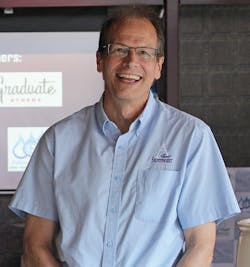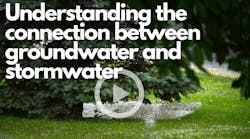Like most stormwater management professionals, Todd Stevenson is cognizant that the nature of stormwater mitigation stands at the intersection of reviewing the impact of past practices with an eye to future impacts. Stevenson is the stormwater division administrator for the Public Works Department of the Unified Government of Athens-Clarke County (ACCGOV) in Georgia.
He is involved in plan reviews, inspections of temporary and long-term practices connected with new developments, inspections of existing stormwater control measures, community outreach, chasing down illicit discharges, designing stormwater infrastructure, and incorporating best practices in the division’s projects. “All of this needs to be funded in a way that is as equitable as possible while constantly keeping an eye on our investments of time and money,” notes Stevenson. The ACCGOV stormwater fee was first billed in 2005. “At that time, the strategy was to fund most stormwater capital investments through a special purpose local-option sales tax,” he says. “The resiliency of Athens-Clarke County has been bolstered recently by emergency storm pipe repairs funded through the stormwater fee. Looking ahead, consideration is being given to including the enterprise fund as part of the long-term solution for our stormwater capital program. Another outcome of our stormwater funding review will be to make fee credits more readily available to customers.” ACCGOV’s stormwater program operates under an NPDES Phase II permit. The watershed management program includes assessing the condition of the county’s 17 watersheds and developing effective improvement plans through stream walks, sampling, modeling, and BMPs.
What He Does Day to Day
“In the two years I’ve been privileged to serve as the stormwater division administrator within ACCGOV, we've conducted a comprehensive review of our stormwater funding strategy, revised our stormwater management ordinance to encourage redevelopment and adaptive reuse while preserving green space, and assisted with a critical need to replace failing corrugated metal storm pipes,” says Stevenson. He’s working to address technical standards to minimize flood hazards, improve water quality, and adapt to a changing environment. Stevenson says he’s pleased to have helped institute an online bill payment system for stormwater customers.
What Led Him to This Line of Work
The Scioto River was an early influence on Stevenson’s career choice. “My dad drove us through streets that were already starting to flood when the order came to evacuate the east end of Chillicothe, OH, in January 1959,” he says. “Although I was too young to remember that experience, I will never lose the memory of my mom’s expression when she described to us everything we lost.” Stevenson says the growing environmental awareness of the 1960s and 1970s “affected me along with all of the time my brothers and I spent turning over rocks in a nearby creek to discover fossils, crayfish, and salamanders.” Stevenson earned a B.S. in environmental engineering from Purdue University in 1980. “This field of study was nontraditional at the time,” he says. “It was essentially civil engineering with an emphasis on wastewater treatment.”
What He Likes Best About His Work
Stevenson enjoys being part of a team, each member of which is invested in serving the community. “Exploring ways to make things better motivates all of us,” he says. “Stormwater touches on many other ACCGOV departments in addition to outside community organizations along with everyone who lives and works here.” While he credits the Clean Water Act as being of great help in stormwater mitigation efforts as well as the oversight from the Georgia Environmental Protection Division, “we are the ones at the local level who bring legislation to life,” notes Stevenson. “We have to conscientiously pay attention to people and figure out ways to make our stormwater program work for everyone, given the unique circumstances in this community.”







